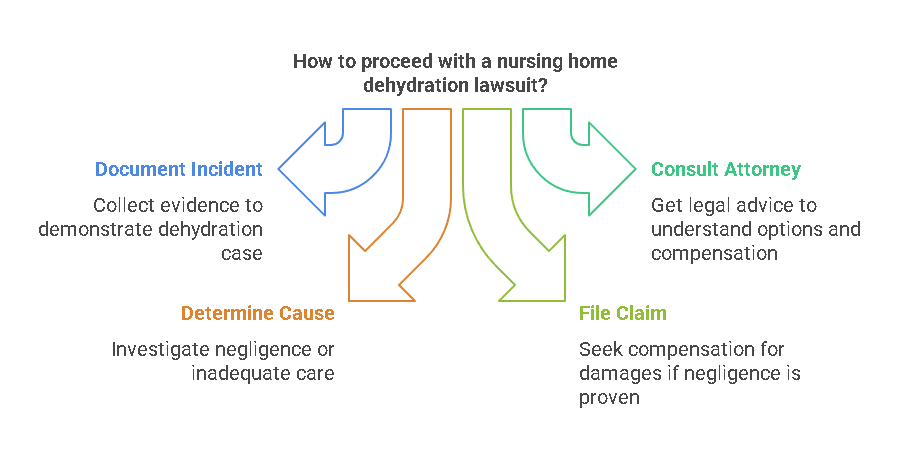When your loved one is entrusted to the care of a nursing home, you expect them to receive the highest level of care, compassion, and respect. Unfortunately, dehydration in nursing homes has become a serious and often overlooked issue. If your family member has suffered dehydration in a nursing home, their health and quality of life may have been severely harmed.
At Chicago Injury Lawyer, we are committed to fighting for the rights of those who have experienced nursing home neglect and abuse.
Why Choose a Chicago Nursing Home Dehydration Attorney?
Dehydration in nursing homes is a clear sign of neglect. Nursing homes are legally required to monitor and maintain residents’ hydration levels. Failure to do so can lead to serious complications, including kidney failure, cognitive impairment, and even wrongful death. If you believe your loved one has been harmed by dehydration due to nursing home negligence, we are here to help.
Chicago Injury Lawyer has a dedicated team of experienced lawyers who specialize in nursing home dehydration cases. Our legal team is dedicated to fighting for justice on your behalf, ensuring that those responsible for the harm your family has endured are held accountable.
Our nursing home dehydration attorney in Chicago aims to provide the support and guidance you need during this difficult time and help secure financial compensation.
What is Nursing Home Dehydration?
Dehydration occurs when the body loses more fluids than it takes in. In nursing homes, this can happen if residents are not given enough fluids or if their fluid intake is not monitored correctly. Seniors are at an increased risk of dehydration due to age, medication side effects, and physical limitations. However, it is the responsibility of nursing home staff to ensure that all residents remain correctly hydrated.
Signs of dehydration in nursing homes include:
- Dry mouth and lips
- Sunken eyes
- Confusion or disorientation
- Decreased urine output
- Dizziness or fainting
- Fatigue or lethargy
If you notice any of these signs in a loved one, it is essential to take action immediately.
Legal Rights for Nursing Home Dehydration in Chicago
In Illinois, several laws provide legal protections for nursing home residents who suffer from dehydration due to neglect. Here’s a brief overview of the key legislation that may apply:
Illinois Nursing Home Care Act (NHCA)
The NHCA ensures that nursing homes provide residents with proper care, including adequate hydration. It mandates that facilities maintain the health and safety of their residents, making dehydration due to neglect a violation of this law.
Illinois Abuse and Neglect of Long-Term Care Facility Residents Act
This Act defines neglect as the failure to provide essential care, such as food and hydration, in long-term care facilities. It allows families to hold nursing homes accountable if dehydration results from inadequate care.
Illinois Adult Protective Services Act
The Adult Protective Services Act safeguards vulnerable adults, including nursing home residents, from abuse and neglect. It provides mechanisms for reporting and investigating neglectful behavior, including failure to address dehydration.
Illinois Wrongful Death Act
If dehydration leads to the wrongful death of a nursing home resident, the Illinois Wrongful Death Act allows the family to seek compensation for their loss due to the facility’s neglect.
Illinois Personal Injury Act
The Personal Injury Act provides a legal avenue for victims or their families to seek damages for injuries caused by nursing home dehydration. This can include compensation for medical costs, pain and suffering, and emotional distress.
In cases of nursing home dehydration, Illinois residents have strong legal protections. These laws hold nursing homes accountable for failing to provide proper hydration and care, allowing families to seek justice for their loved one’s harm.

Nursing Home Dehydration and Negligence
Nursing home staff members are responsible for the following:
- Monitoring residents’ daily fluid intake
- Reporting signs of dehydration
- Ensuring residents are given the necessary medical care
- Maintaining a safe environment
- Providing proper nutrition and hydration
Failure to fulfill these responsibilities is considered nursing home neglect and may be grounds for a lawsuit. In cases where dehydration leads to severe injury or death, it may be classified as nursing home abuse.
Nursing Home Dehydration Lawsuit: What You Need to Know
If you are considering filing a lawsuit for dehydration in a nursing home, here are some key steps you need to take:
Document the Dehydration Incident
Gather evidence such as medical records, photos, and witness testimony to show how your loved one suffered from dehydration.
Consult with an Experienced Attorney
Speak with a Chicago nursing home dehydration lawyer to understand your legal options and the potential for compensation.
Determine the Cause of Dehydration
Investigate whether the dehydration was due to staff negligence, inadequate care, or other forms of abuse.
File a Claim for Compensation
If negligence is proven, you may be entitled to compensation for medical expenses, emotional distress, pain and suffering, and more.

Common Causes of Nursing Home Dehydration
Dehydration in nursing homes can result from various factors, often involving neglectful or improper care. Some of the most common causes include:
- Inadequate Monitoring of Fluid Intake
Nursing home staff may fail to monitor and encourage residents to drink enough fluids.
- Improper Medication Management
Certain medications can increase the risk of dehydration, and nursing homes must carefully monitor residents on such drugs.
- Failure to Recognize Early Warning Signs
Staff may overlook or misinterpret the early signs of dehydration, leading to more severe consequences.
- Staff Shortages
When nursing homes are understaffed, caregivers may not be able to adequately monitor all residents, leading to neglect.
- Poor Nutrition and Lack of Support
Malnutrition and dehydration often go hand-in-hand. If a resident is not receiving enough food or water, they are at higher risk of both conditions.
Compensation Available in a Nursing Home Dehydration Lawsuit
If your loved one has suffered from dehydration or other forms of neglect in a nursing home, you may be entitled to compensation for:
- Medical Bills: Covering the cost of hospital stays, treatments, and any necessary surgeries.
- Pain and Suffering: Compensation for the emotional and physical pain your loved one endured.
- Funeral and Burial Expenses: If dehydration led to wrongful death, you may be entitled to compensation for funeral costs.
- Loss of Quality of Life: If the dehydration led to permanent physical or mental impairments, your family may be eligible for compensation for the loss of your loved one’s quality of life.
Get a Free Case Review Today
Time is of the essence, and we are here to ensure that your loved one’s voice is heard. If you are grieving the loss of a loved one due to nursing home dehydration or suspect they have suffered from neglect, now is the time to take action. Our Chicago Injury Lawyer is here to fight for your family’s justice. Let us help you navigate this difficult journey and pursue the compensation and peace of mind your family deserves. Call (312) 261-5656 for a free, honest, no-obligation legal consultation about your injury case. If you’re unable to travel, we can come to you.
Frequently Asked Questions
What should I do if I suspect my loved one is dehydrated in a nursing home?
First, notify the nursing home management and request they investigate the situation. Document any signs of dehydration and seek medical attention for your loved one.
How can a nursing home dehydration attorney help my case?
A skilled attorney will gather evidence, investigate the cause of dehydration, and help you pursue compensation for medical expenses, pain, and suffering.
What kind of compensation can I receive in a nursing home dehydration lawsuit?
You may be entitled to compensation for medical bills, emotional suffering, lost wages, wrongful death, funeral expenses, and loss of companionship.
How long must I file a nursing home dehydration lawsuit?
In Illinois, the statute of limitations for nursing home abuse or neglect cases is typically two years from the date of the incident. Still, it’s essential to contact an attorney as soon as possible.



